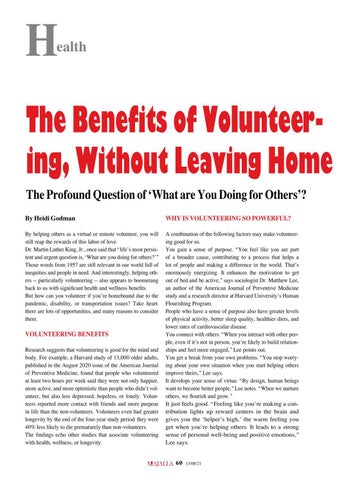H
ealth
The Benefits of Volunteering, Without Leaving Home The Profound Question of ‘What are You Doing for Others‘? By Heidi Godman
WHY IS VOLUNTEERING SO POWERFUL?
By helping others as a virtual or remote volunteer, you will still reap the rewards of this labor of love. Dr. Martin Luther King, Jr., once said that “life’s most persistent and urgent question is, ‘What are you doing for others?’” Those words from 1957 are still relevant in our world full of inequities and people in need. And interestingly, helping others -- particularly volunteering -- also appears to boomerang back to us with significant health and wellness benefits. But how can you volunteer if you’re homebound due to the pandemic, disability, or transportation issues? Take heart: there are lots of opportunities, and many reasons to consider them.
A combination of the following factors may make volunteering good for us. You gain a sense of purpose. “You feel like you are part of a broader cause, contributing to a process that helps a lot of people and making a difference in the world. That’s enormously energizing. It enhances the motivation to get out of bed and be active,” says sociologist Dr. Matthew Lee, an author of the American Journal of Preventive Medicine study and a research director at Harvard University’s Human Flourishing Program. People who have a sense of purpose also have greater levels of physical activity, better sleep quality, healthier diets, and lower rates of cardiovascular disease. You connect with others. “When you interact with other people, even if it’s not in person, you’re likely to build relationships and feel more engaged,” Lee points out. You get a break from your own problems. “You stop worrying about your own situation when you start helping others improve theirs,” Lee says. It develops your sense of virtue. “By design, human beings want to become better people,” Lee notes. “When we nurture others, we flourish and grow.” It just feels good. “Feeling like you’re making a contribution lights up reward centers in the brain and gives you the ‘helper’s high,’ the warm feeling you get when you’re helping others. It leads to a strong sense of personal well-being and positive emotions,” Lee says.
VOLUNTEERING BENEFITS Research suggests that volunteering is good for the mind and body. For example, a Harvard study of 13,000 older adults, published in the August 2020 issue of the American Journal of Preventive Medicine, found that people who volunteered at least two hours per week said they were not only happier, more active, and more optimistic than people who didn’t volunteer, but also less depressed, hopeless, or lonely. Volunteers reported more contact with friends and more purpose in life than the non-volunteers. Volunteers even had greater longevity by the end of the four-year study period: they were 40% less likely to die prematurely than non-volunteers. The findings echo other studies that associate volunteering with health, wellness, or longevity.
60
13/08/21

